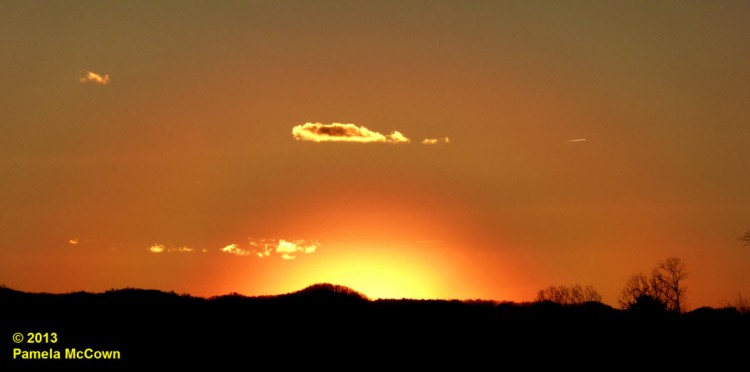From the Institute for Climate Education at A-B Tech: Timing is everything, especially when weather conditions change as quickly as they do in the mountains. Tuesday morning, Feb. 19, brought huge fluffy snowflakes to the higher elevations, quickly adding up to a couple of inches of snow. And, almost as quickly, the sun emerged and helped to melt most of the snow away. (You can watch the day play out on the Institute’s HD webcam here where you can actually see the wet snow flakes hitting the camera lens.*)
The whiplash of a day ended with a stunning sunset that was enhanced by concentric halos around the setting sun. The rings are most likely the result of the light from the setting sun being scattered by tiny smoke, dust and haze particles in the atmosphere. The scene was so eye-catching that I pulled off of the road during my commute home to catch the image below. In a matter of seconds, it was gone.

In addition to keeping us all on our toes, this active winter weather pattern has brought abundant rainfall to the mountains. The State Climate Office of North Carolina released a statement today naming January 2013 as the wettest on record for Western North Carolina. You can find that information here.
To date: February has not been a big rainmaker at the Asheville Regional Airport. AVL is reporting rainfall that is 1.28 inches below normal for the month. However, January was so wet that when you factor last month in, AVL is 3.63” above normal for the year. Landslides and flooding aside, it’s a good thing to have abundant moisture across the region, as we head into the spring wildfire season.
And, the beat goes on. Yet another system will move across the region late Thursday and Friday, adding additional rain into area rain gauges, and possibly more winter precipitation at the higher elevations.
The good news: The rain should hold off until after the Institute’s screening of the energy documentary film SWITCH at 4 p.m. Thursday (Feb. 21) at Ferguson Auditorium on A-B Tech’s main campus. The screening is made possible thanks to the Colburn Earth Science Museum and will be followed by a Q&A session hosted by Jon Snover, PhD, Director of the Global Institute for Sustainability Technologies at A-B Tech. You’ll find more information about the event here.
The screening is open to everyone so I hope you will plan to join us … and bring a friend.
* Note – If you access the Institute’s HD webcam on an iPhone or iPad, you will receive an error. This is an issue that we are aware of and are working to fix the problem.



Before you comment
The comments section is here to provide a platform for civil dialogue on the issues we face together as a local community. Xpress is committed to offering this platform for all voices, but when the tone of the discussion gets nasty or strays off topic, we believe many people choose not to participate. Xpress editors are determined to moderate comments to ensure a constructive interchange is maintained. All comments judged not to be in keeping with the spirit of civil discourse will be removed and repeat violators will be banned. See here for our terms of service. Thank you for being part of this effort to promote respectful discussion.